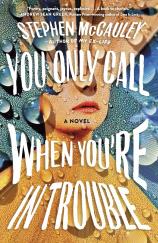Excerpt
Excerpt
You Only Call When You're in Trouble

Thus far, Dorothy had written her daughter three versions of the email inviting her to the opening of her retreat center in Woodstock, New York, but she hadn’t had the nerve to send any of them. In each message, she’d said that, along with wanting Cecily at the “gala”—the term her business partner had insisted upon using—she needed to talk with her. “There’s something important I’m finally ready to tell you,” she’d written in the first draft. Direct and honest, but she’d chickened out before sending it. Too ominous in tone. Cecily would think she had a terminal disease.
“There’s something you and I need to discuss” had been the second version. After reading it a third time, Dorothy was troubled by the portentous ring. It sounded almost like she was about to scold Cecily. In thirty-four years, she’d never once scolded Cecily. That was for more conventional, disciplinary, and—let’s face it—boring mothers. She couldn’t stand the suggestion that she was about to start now.
When she composed and rejected the third and most-watered-down version (“I’d love for us to chat”), Dorothy had to admit her main concern wasn’t Cecily’s reaction but her own misgivings. Bringing up the topic in even the most obtuse way induced a flutter of anxiety that was akin to a heart palpitation, a symptom she now knew too well.
At this hour of morning, the sunlight that poured through the huge new window Dorothy had installed in the building she’d bought almost a year ago was blinding. Everyone who walked into the place praised it and raved about “the light.” There was that, but the truth was, she preferred rooms in which the weather and the time of day were easy to avoid or ignore. When she lived outside Boston, she’d sometimes sneaked off to the casino in Connecticut and spent a day or two there. She’d always been drawn to gambling, but more than anything, she loved being in a place where time didn’t exist.
She shouldn’t have let her designer friends talk her into this expensive addition. Because she had, she’d do what she’d always done: fake loving it in the hope that, eventually, she really would. That hadn’t worked with her first boyfriend or her ex-husband, but it had been an effective strategy with sushi and T. S. Eliot.
She repositioned her laptop to face away from the sun and tried the email again.
Finally telling her daughter the truth about her father was the right thing to do. It was time. Cecily had been with the same boyfriend for a few years now, and at some point, they might get married and have a baby. People cared about DNA these days, especially when it revealed interesting roots—that one drop of Egyptian blood that connected you directly to Cleopatra. Cecily had a right to know hers. No royalty in their background that Dorothy knew of, but certainly an element of the unexpected.
The problem was that Dorothy was proud of how honest and blunt she’d always been with Cecily, right from childhood. It had been the guiding principle of her relationship with her. She’d talked with her daughter about her problems with men, her use of drugs, Tom’s (her brother and Cecily’s uncle) sexuality, even the love affairs of the assorted people who sometimes stayed with them. She’d always treated Cecily like a (much) younger friend. Telling her now that she’d known the identity of her father all along and, obviously, how to contact him would be an admission of her having lied about this crucial piece of information for decades. She hated to paint herself as a liar, especially as a result of telling the truth. She couldn’t bear the thought of turning Cecily against her.
She read over the email yet again. She had to send this off. The opening party—the word gala had the same cringe factor for her as town home—was in two weeks, and she’d promised Fiona, her business partner, she would invite as many people as possible. In fairness, she needed to give Cecily advance warning and time to make plans. The whole point of including these hints was to demolish the option of changing her mind about telling her.
The retreat center was Dorothy’s last chance at a business success, a way to redeem herself for past disappointments, to repay Tom what she owed him, and to leave Cecily a small legacy. Fiona had assured her that with her name (made from a bestselling self-help book Dorothy hadn’t read yet), they could run a couple of weekend seminars each month and bring in an impressive mid-six figure in the first year alone. “When my next book comes out,” she’d said, “we can expand, and things will really take off.”
Dorothy had turned on some music when she sat down to write this email. The designer friends had programmed her cell phone and hooked it up to a speaker system, so even she knew how to put on a playlist. She hadn’t been paying much attention for the past hour, but now, at just the right moment, she heard the familiar clear soprano of 1970s Joni Mitchell. This had been the background music to most of the important moments in her life. It was Mitchell’s iconic song about this town that had given Dorothy the courage to move here. We are stardust, we are golden … Impossible not to think of the random appearance of Joni, right here, right now, in her too-sunny living room, as a sign. By the end of the song, she’d send the email.
She turned up the volume and started to type.
Chapter One
Later, Cecily would think of her mother’s email as the beginning of her own downfall. She was in a café on North Clark, a mere three blocks from the apartment in Chicago she shared with her boyfriend, Santosh, when she received it. The subject line was “Back to the Garden: Upcoming Event.” Cecily knew there would be something upsetting in it—the clue was it had come from her mother—so she decided to finish her coffee before opening it. But, of course, the problem wasn’t the email. Her downfall had begun earlier and was due to her own behavior and bad decisions. She’d been accused of awful things recently, but no one was going to accuse her of not taking responsibility for her troubles.
Cecily had received a generous and prestigious grant that had allowed her to take this spring semester off from teaching. The plan had been to finish researching and begin writing her next book. It was another step up in what seemed to be the unstoppable ascent of her career.
It was now late April. She’d begun spending big chunks of time in this café only when Deerpath’s administration and the Title IX office had contacted her at the end of February, telling her there was a problem and suggesting it would be best for Cecily to avoid campus until their investigation into the allegations against her had been completed and a verdict reached. So much for ascent.
She wouldn’t try to pin any of that on Dorothy.
It was hard to accept that the words allegations and investigation were now part of her life and harder still to believe that, at thirty-four, just as her academic career was taking off, her future depended upon a “verdict.” Dorothy’s email would provide a distraction, even if a complicated one.
The Daily Grind had a rough-hewn décor somewhere between Wild West barroom and steampunk industrial cafeteria. It was loud and, like so many things with a hipster aesthetic—vintage furniture that was stylish but impractical; overpriced artisanal food whose appeal was more in backstory than flavor; beards—on the edge of unpleasant. Still, half the people surrounding Cecily had become nodding acquaintances over the past month or so. There was the tall woman who appeared to be attempting to organize her tax returns, sometimes with lip-biting frustration; the man surrounded by grubby notebooks who was either insane or writing a novel, not that the two were mutually exclusive; and the wired students of indeterminate age and gender who reminded Cecily, alas, of the young woman who was her accuser.
Then there was Molly, the harried woman with windstorm hair across the table from her now, who was always in residence, often conducting business on her phone at full volume. She and Cecily exchanged the kinds of complaints about weather, international news, and background music that made her feel almost like a friend.
Cecily had begun to appreciate this scrappy community. The world was now too frightening a place in which to go it solo. Everyone—she included herself—in her liberal, academic bubble lived in a state of near-constant outrage and anxiety over the next political atrocity, the rise of fascism, and imminent catastrophe on every front. Who wanted to die alone?
Santosh was an exception. Death wasn’t anywhere on his radar. He worked at a small start-up where he and six of his college friends designed computer games. He exuded an aura of good-natured optimism that came from his belief that salvation was always possible, as long as you had excellent hand-eye coordination, knew the right codes, and smoked the right amount of weed. Cecily didn’t believe any of this, but it was comforting. It was like listening to people talk about meeting dead loved ones in the afterlife: utterly implausible but sweet. Santosh’s cheery optimism was one of the many differences between them that made Cecily love him. As for the rest of his appeal—well, look at the guy.
Once she received word about the investigation, she began withdrawing from friends and had stopped returning calls. Everyone would be sympathetic, of course, but she wasn’t up to retelling the events leading up to now, painting herself as blameless, questioning the motives of her student. It was all so much more complicated than that. She certainly wasn’t up to hearing about her academic friends’ own professional advances. It was easier to exchange pleasantries with the likes of Molly and pretend it was a blossoming friendship. Maybe it was.
Contemplating catastrophe, she opened her mother’s email.
Sweetheart!
I have a big announcement. I’m starting a business here in Woodstock with (drum roll) Fiona Snow. Her book was a massive success a few years ago, and she has a huge following. You must have read it. Who hasn’t? (Me, but don’t tell Fiona. I skimmed.) This investment is going to make your future more secure once I’m gone.
Copyright © 2024 by Stephen McCauley
You Only Call When You're in Trouble
- Genres: Fiction
- paperback: 336 pages
- Publisher: Holt Paperbacks
- ISBN-10: 1250296811
- ISBN-13: 9781250296818


